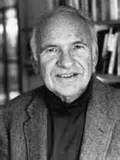
Richard A. Couto

James MacGregor Burns

Richard A. Couto
James MacGregor Burns, Jim to everyone who knew whom outside of the pages of his prodigious scholarship, passed away in his sleep on July 15th, three weeks short of his 96th birthday. He had been in declining health for several years but maintained his scholarly engagement publishing four new books in the past five years!
It is his 1978 work, Leadership¸ that those of us in the field of leadership studies remember him best because it changed the field in several ways. Of course, it provided the transactional/transforming distinction now widely applied to a variety of roles; most recently, I heard an athletic coach used the terms to explain approaches to head injuries. Within that distinction, Burns injected the central role of moral values in leadership—most especially order, justice, liberty, justice and the pursuit of happiness—and clarified the reflexive relationship of leaders and followers. In contrast to the mainstream of work on leadership, Burns never wrote on business and seldom formal organizations. Despite the wide range of application of his work, his main concerns were with political leadership—in formal and informal settings—for social change.
It would be an overstatement to describe Burns as a proto-integral theorist but nonetheless accurate to say that he anticipated some elements of the field. First and foremost, as a student and admirer of the Enlightenment, he sought a general theory of leadership and maintained hope that rigorous scholarship would eventually uncover it. Second, he borrowed from political science, history and psychology, primarily, to provide a paradigmatic exemplar of interdisciplinary work. Finally, we see in his work inchoate efforts to distinguish and relate leader, leadership, leading, power and authority.
Burns’s most public legacy lies in the example of his efforts to wrestle historical events to the ground and make sense of them in large conceptual frameworks, such as leadership, as he did in his 1978 book. Twenty-five years later, in his work Transforming Leadership, we find another, more personal, part of his legacy; the courage to revisit his earlier formulations and wrestle with them as well. Burns came to see transforming leadership largely through the lens of empowerment and he found a paradox there. Most studies of leadership, and perhaps much of his first work, assume that empowerment is one-directional. However, what is to prevent empowered followers from acting like leaders? Burns resolves this paradox by abandoning the hint of dichotomous thinking in his first work and taking on a most integral description of leadership as a system of mutual empowerment.
I will defer to this voracious thinker, splendid writer, and kind and gentle man and let him speak for himself from his 2003 book, Transforming Leadership.
With … a dynamic and mutually empowering interaction between leader and follower, a crucial change occurs. The process is so complex and multidimensional, so fluid and transforming, that persons initially labeled “leaders” or “followers” come to succeed each other, merge with each other, substitute for each other. Leader and follower roles become ephemeral, transient, and even indistinct.
Leadership electrifies the system as followers become leaders and vice versa….
The Burns Paradox ultimately disappears if instead of identifying individual actors simply as leaders or simply as followers, we see the whole process as a system in which the function of leadership is palpable and central but the actors move in and out of leader and follower roles. At this crucial point we are no long seeing individual leaders; rather we see leadership as the basic process of social change, of causation in a community or an organization, a nation—perhaps even the globe (185).

Thank you for sharing this tribute. It is always satisfying to learn more of these giant scholars and their particular areas of focus and bit more about them as who they were. I especially appreciate the end piece about the dynamic, evolving relationship between those who, initially, lead and those who follow.